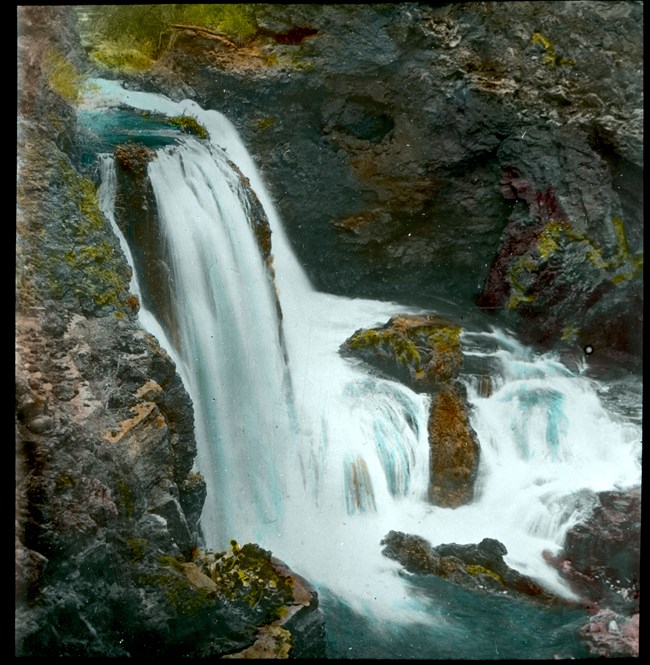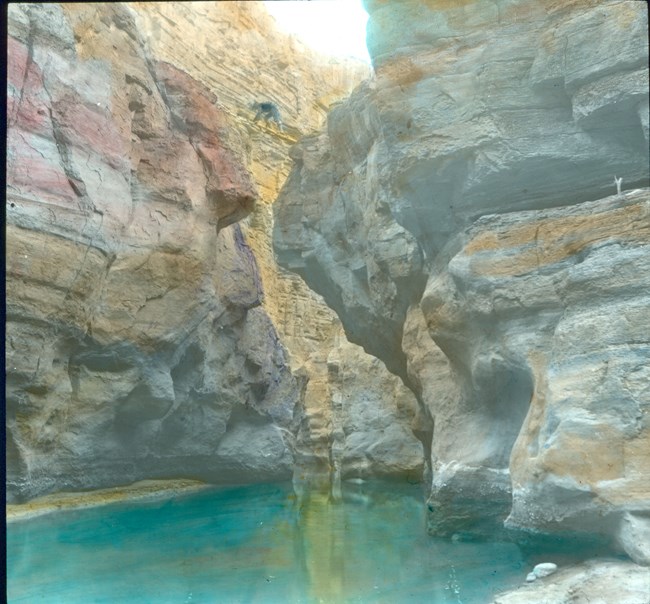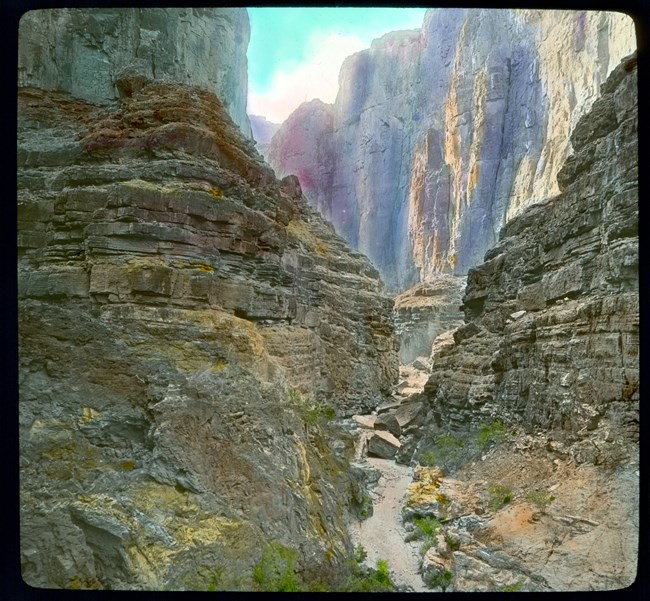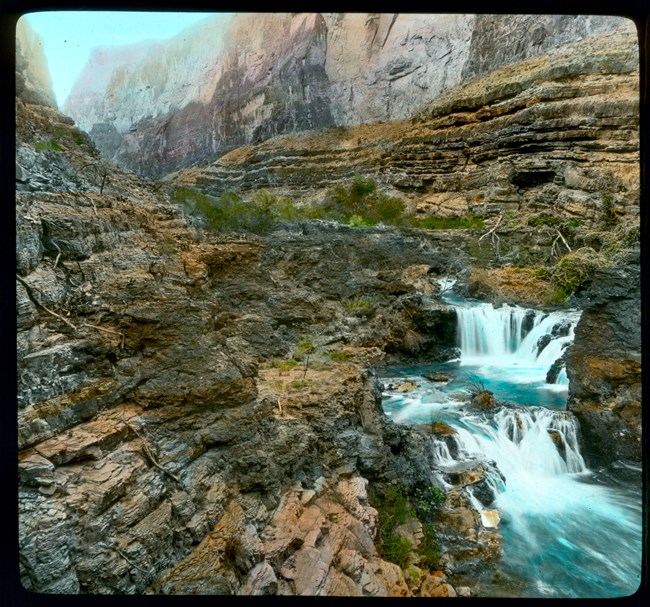Part of a series of articles titled Grand Canyon Centennial Stories.
Article
1899 - An Adventure in Beaver Canyon
George Wharton James
I have had many a perilous adventure in my ten years of exploring in the
canyons of the Colorado River, but none so peculiar as one I passed through this
year (1899). My note-book says:
I have had many a perilous adventure in my ten years of exploring in the
canyons of the Colorado River, but none so peculiar as one I passed through this
year (1899). My note-book says:

about twenty-five feet. The space between these two precipices is perhaps two hundred to two hundred and fifty feet long, and is occupied by a deep pool of water. An hour ago I almost despaired of leaving the place alive. Bruised, bleeding, exhausted with my futile endeavors to scale the smaller precipice down which we had come, I sank back into the deep water almost helpless, the Indian had about given up in despair, when I determined upon making another and a different effort.

Others starting from the Havasupai village claim that they have stood where the pure blue waters of Havasu Creek mingle with the dirty red of the Colorado, but my efforts have not been crowned with success.
On talking the matter over with Wa-lu-tha-ma, who with Yu-ta controls this portion of the canyon as a range for his stock, he suggested that, instead of descending to the foot of Mooney Fall, we ride along the plateau above, detour to the south to thehead of a short but frightfully deep tributary canyon known as Beaver Canyon, ascend to its head, and, starting down its bed, reach the junction that way. It is astonishing how easy such trips look when one is merely talking or writing about them, and how the difficulties magnify as the endeavor is being made.
I decided to attempt the descent the way Walu-tha-ma suggested, and on Saturday, August 3, 1899, the two of us set forth. We rode along on the edge of the canyon, on the plateau made by the long-ago denudation of the strata above, and at places came to where, without dismounting from my horse, I could look down into the frightful depths of the canyon to my right, to where the cottonwood trees and flowing water gave life and wondrous enchantment to what would otherwise have been an awful hell of barren rocks. For the walls here were not more than a couple of stone throws apart, two hundred or three hundred yards, and yet they were a sheer two thousand feet or more in actual, unbroken depth. No wonder that even the Indian kept as far away from the edge as he could.

After walking down perhaps a quarter of a mile, we lunched and then pushed
forward.
In less than an hour we came to the place of our fate, the place where I now write, and where Wa-lu-tha-ma lies asleep, wearied, exhausted with his heroic and successful climb back to life. Poor fellow! It is time we were returning, but I have not the heart to awaken him. Let him sleep and gain the rest he has well deserved, for had it not been for him I should be down below on the nether edge of that pool, shivering myself to death, a shiver more of fear than of cold.
We had passed one rather big downward jump caused by a blocking boulder when we came to this. Try to picture two marble walls, several hundred feet high and lessthan twenty feet wide. Immediately where we are two immense boulders of sandstone have fallen in, and, aided with lesser rocks, have completely blocked up the narrow space.
To the right the tiny stream flows rapidly down the steep bed of the canyon. It dashes into a small pool under the larger of the two boulders and then down a marble slide or chute into the great pool beneath, which is fully twenty feet in depth at this end.
When we reached this spot, Wa-Iu-tha-ma, after examining it, laughed and cried out, No in-yah-a - 'no trail, no way,' and said we must go back. Seeing my intense disappointment, he looked again, and as I gazed into the dark pool of deep waters. I asked whether he dare plunge into this deep reservoir, and swim to the farther end, and there look down to see what the prospects were for continuing our journey. He said he would go if I would. We could tie the rope to a boulder above and then pull ourselves up after we had investigated the situation.

As I came to the surface and looked up that horrible marble slide down which the water was flowing, - as it had been doing for centuries, making the rock as smooth as if polished by a lapidary, and up the other side where the sandstone boulder stood at an angle so slightly tilted from the perpendicular as to seem absolutely precipitous.
How should we get back? The Indian laughed with thoughtless glee. " No yarm-i-gi," he cried, 'no way of getting back.' Hastily I swam to the lower end of the pool and found worse conditions there than at the upper end. It was another precipice deeper than the one over which we had come, and at the foot of it another pool equally as large as the one through which we had swum. And what beyond ? I did not know, but Wa-Iu-tha-ma did. There was no way out down there, he said, except to struggle on, naked as we were, to the junction of the Havasu, then up to Mooney Fall, and endeavor to climb out up the old and dangerous ladder.
This made even the Indian serious, and, swimming to the upper end, he tried andtried and tried again to scale the marble slide and the sandstone wall. But they were alike insensible to the danger of our state, and yielded not an iota of their impossible conditions. Then I tried, and the rough sandstone scraped away large pieces of my cuticle here and there, and the cruel marble bruised me almost everywhere as I slipped and slipped again in my desperate attempts to ascend. Then it was that I thought of trying to remove a smaller boulder that acted as a keystone by the side of the great boulder that dammed the lower end of the pool. I thought if this could be taken up, a large amount of the water of the upper pool would flow away and give us a better chance for our escape, than struggling up a steep-faced rock directly from deep water. But Wa-Iu-tha-ma thought the water better than nothing to fall back in. 'Nothing,' meant being bruised on the rocks beneath, and perhaps dashed to death. Then why not try to carry some of the smaller rocks; build up a standing place; get it as high as possible; then one of us stand on that to give the other a boost up the rock to where, possibly, a hand hold could be reached, and thus escape made possible.
It was hard work to swim, sometimes on the surface, but oftener under the water, with heavy rocks in our hands, and it was frightfully slow work building up a pile high enough to be of any service. But we kept at it. Sometimes we got a rock half-way across the pool and were compelled to drop it. Then rising to the surface for air, we would float a moment or two, regain breath, strength, and courage, dive down, seize the rock, and with a desperate forward dive seek to put it in place. . At last I deemed the pile high enough. We sat down and rested, and studied out a plan of action.
Wa-Iu-tha-ma was to go first, get on the pile, and obtain as good a hand and foot hold as he could. I was to follow, and, planting myself firmly on the rock pile, help him up in any and every way until he could stand on my body or shoulders or head, and thus get out. Fortunately we had a second rope above, so that it was not necessary for him to be weighted with the innocent cause of our misfortune as he made his endeavors. We did as we had planned. Twice he slipped back, and forced me to make a backward dive off the pile. But the third time he fairly seemed to hang on with his fingernails and eyebrows, while I braced myself to bear his strugglings as he stood on my body and shoulders reaching upwards. At last, with one shout and a grunt of content his weight left me, and he was safe on top.
Joyfully I dived in, returned to the other end of the pool for the treacherously tied rope, swam back, and pulled myself out as Wa-lu-tha-ma held the other rope. It is easy to laugh at it all, now that it is over, but as I stretch over Wa-lu-tha-ma's sleeping form ere I wake him, and look down into that deep shady pool, the 'shivers' go over me, and ask myself two questions: What would I have done without Wa-lutha-ma? and, Is there a Providence that watches over such a careless explorer as I am?
We were tired out when we arrived late that afternoon at Wa-lu-tha-ma's ha-wa, which we had left in the morning. .The Havasupais had openly prophesied that wecould not make the descent, so I was not surprised, three minutes after our return, to see men, women, and children come around as if they had been on the lookout. As soon as possible Wa-lu-tha-ma and I sat down to eat, surrounded by about thirty of the Indians. They listened with great glee to the recital, by my companion, of our attempt and failure. I was made the butt of the major part of the fun.
Wa-Iu-tha-ma ate and ate and continued to eat, and the coffeepot was twice replenished ere he had completed his story. Knowing the joking propensities of his people and their utter indifference to the feeling of any person out of whom they can extract a little fun, I was prepared for the rude jokes and vulgal witticisms expended upon me, and sat, eating and drinking with the stolidity of a Hottentot or a Havasupai. If they enjoyed making me the object of their fun I was quite willing, since I was safe out of the adventure. But I am going again some day.
It was hard work to swim, sometimes on the surface, but oftener under the water, with heavy rocks in our hands, and it was frightfully slow work building up a pile high enough to be of any service. But we kept at it. Sometimes we got a rock half-way across the pool and were compelled to drop it. Then rising to the surface for air, we would float a moment or two, regain breath, strength, and courage, dive down, seize the rock, and with a desperate forward dive seek to put it in place. . At last I deemed the pile high enough. We sat down and rested, and studied out a plan of action.
Wa-Iu-tha-ma was to go first, get on the pile, and obtain as good a hand and foot hold as he could. I was to follow, and, planting myself firmly on the rock pile, help him up in any and every way until he could stand on my body or shoulders or head, and thus get out. Fortunately we had a second rope above, so that it was not necessary for him to be weighted with the innocent cause of our misfortune as he made his endeavors. We did as we had planned. Twice he slipped back, and forced me to make a backward dive off the pile. But the third time he fairly seemed to hang on with his fingernails and eyebrows, while I braced myself to bear his strugglings as he stood on my body and shoulders reaching upwards. At last, with one shout and a grunt of content his weight left me, and he was safe on top.
Joyfully I dived in, returned to the other end of the pool for the treacherously tied rope, swam back, and pulled myself out as Wa-lu-tha-ma held the other rope. It is easy to laugh at it all, now that it is over, but as I stretch over Wa-lu-tha-ma's sleeping form ere I wake him, and look down into that deep shady pool, the 'shivers' go over me, and ask myself two questions: What would I have done without Wa-lutha-ma? and, Is there a Providence that watches over such a careless explorer as I am?
We were tired out when we arrived late that afternoon at Wa-lu-tha-ma's ha-wa, which we had left in the morning. .The Havasupais had openly prophesied that wecould not make the descent, so I was not surprised, three minutes after our return, to see men, women, and children come around as if they had been on the lookout. As soon as possible Wa-lu-tha-ma and I sat down to eat, surrounded by about thirty of the Indians. They listened with great glee to the recital, by my companion, of our attempt and failure. I was made the butt of the major part of the fun.
Wa-Iu-tha-ma ate and ate and continued to eat, and the coffeepot was twice replenished ere he had completed his story. Knowing the joking propensities of his people and their utter indifference to the feeling of any person out of whom they can extract a little fun, I was prepared for the rude jokes and vulgal witticisms expended upon me, and sat, eating and drinking with the stolidity of a Hottentot or a Havasupai. If they enjoyed making me the object of their fun I was quite willing, since I was safe out of the adventure. But I am going again some day.
Last updated: August 9, 2018
